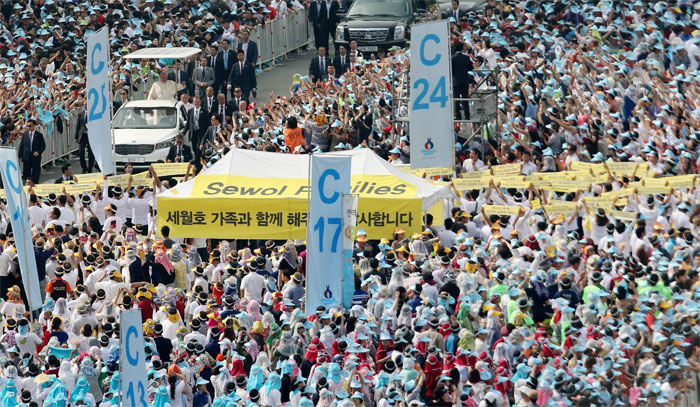Pope Francis (top L) passes a tent for relatives of victims of the Sewol ferry disaster as he arrives to attend a beatification mass at Gwanghwamun Square in Seoul
AFP/Seoul
Pope Francis beatified 124 early Korean martyrs Saturday at a mass in Seoul and challenged the massive crowd to ask what values they might be willing to die for in an increasingly materialistic, globalised world.
Hundreds of thousands of believers, most of them invited church groups from across South Korea attended the open-air ceremony, held in hot, humid conditions in Gwanghwamun plaza -- the city's main ceremonial thoroughfare.
The centrepiece of the pope's five day visit, the beatification mass was the subject of a massive security operation, with bridges, roads and subway stations closed, and police snipers posted on the roofs of overlooking office buildings, which had their windows sealed.
The most prominent among those beatified was an 18th century nobleman, Paul Yun Ji-Chung, who became Korea's first Catholic martyr when he was executed in 1791 after clashing with Confucian officials.
According to the Church, around 10,000 Koreans were martyred in the first 100 years after Catholicism was introduced to the peninsula in 1784.
"They knew the cost of discipleship ... and were willing to make great sacrifices," Francis said in his sermon after the brief beatification ceremony, which gives the martyrs the title "blessed" and marks their first step towards sainthood.
Pope John Paul II canonised 103 martyrs when he visited South Korea in 1984.
"They challenge us to think about what, if anything, we ourselves would be willing to die for," the pope said.
Continuing the theme that has dominated his visit, the pope said the lessons to be learned from the martyrs were as important as ever in an era marked more by selfishness and greed than sacrifice.
"Their example has much to say to us who live in societies where, alongside immense wealth, dire poverty is silently growing; where the cry of the poor is seldom heeded," he said.
Up to one million people had been expected to converge on the venue for the mass, although only 200,000 who pre-registered were allowed to pass through dozens of metal detectors placed along a 4.5-kilometre (three mile) long security ring around the main plaza.

